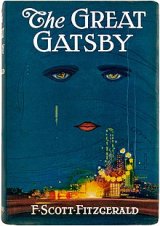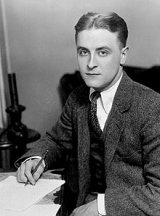The Great Gatsby Page #18
The Great Gatsby is a 1925 novel by American writer F. Scott Fitzgerald. Set in the Jazz Age on Long Island, near New York City, the novel depicts first-person narrator Nick Carraway's interactions with mysterious millionaire Jay Gatsby and Gatsby's obsession to reunite with his former lover, Daisy Buchanan. The novel was inspired by a youthful romance Fitzgerald had with socialite Ginevra King, and the riotous parties he attended on Long Island's North Shore in 1922
“When I said you were a particular friend of Tom’s, he started to abandon the whole idea. He doesn’t know very much about Tom, though he says he’s read a Chicago paper for years just on the chance of catching a glimpse of Daisy’s name.” It was dark now, and as we dipped under a little bridge I put my arm around Jordan’s golden shoulder and drew her toward me and asked her to dinner. Suddenly I wasn’t thinking of Daisy and Gatsby any more, but of this clean, hard, limited person, who dealt in universal scepticism, and who leaned back jauntily just within the circle of my arm. A phrase began to beat in my ears with a sort of heady excitement: “There are only the pursued, the pursuing, the busy, and the tired.” “And Daisy ought to have something in her life,” murmured Jordan to me. “Does she want to see Gatsby?” “She’s not to know about it. Gatsby doesn’t want her to know. You’re just supposed to invite her to tea.” We passed a barrier of dark trees, and then the façade of Fifty-Ninth Street, a block of delicate pale light, beamed down into the park. Unlike Gatsby and Tom Buchanan, I had no girl whose disembodied face floated along the dark cornices and blinding signs, and so I drew up the girl beside me, tightening my arms. Her wan, scornful mouth smiled, and so I drew her up again closer, this time to my face. V When I came home to West Egg that night I was afraid for a moment that my house was on fire. Two o’clock and the whole corner of the peninsula was blazing with light, which fell unreal on the shrubbery and made thin elongating glints upon the roadside wires. Turning a corner, I saw that it was Gatsby’s house, lit from tower to cellar. At first I thought it was another party, a wild rout that had resolved itself into “hide-and-go-seek” or “sardines-in-the-box” with all the house thrown open to the game. But there wasn’t a sound. Only wind in the trees, which blew the wires and made the lights go off and on again as if the house had winked into the darkness. As my taxi groaned away I saw Gatsby walking toward me across his lawn. “Your place looks like the World’s Fair,” I said. “Does it?” He turned his eyes toward it absently. “I have been glancing into some of the rooms. Let’s go to Coney Island, old sport. In my car.” “It’s too late.” “Well, suppose we take a plunge in the swimming pool? I haven’t made use of it all summer.” “I’ve got to go to bed.” “All right.” He waited, looking at me with suppressed eagerness. “I talked with Miss Baker,” I said after a moment. “I’m going to call up Daisy tomorrow and invite her over here to tea.” “Oh, that’s all right,” he said carelessly. “I don’t want to put you to any trouble.” “What day would suit you?” “What day would suit you?” he corrected me quickly. “I don’t want to put you to any trouble, you see.” “How about the day after tomorrow?” He considered for a moment. Then, with reluctance: “I want to get the grass cut,” he said. We both looked down at the grass—there was a sharp line where my ragged lawn ended and the darker, well-kept expanse of his began. I suspected that he meant my grass. “There’s another little thing,” he said uncertainly, and hesitated. “Would you rather put it off for a few days?” I asked. “Oh, it isn’t about that. At least—” He fumbled with a series of beginnings. “Why, I thought—why, look here, old sport, you don’t make much money, do you?” “Not very much.” This seemed to reassure him and he continued more confidently. “I thought you didn’t, if you’ll pardon my—you see, I carry on a little business on the side, a sort of side line, you understand. And I thought that if you don’t make very much—You’re selling bonds, aren’t you, old sport?” “Trying to.” “Well, this would interest you. It wouldn’t take up much of your time and you might pick up a nice bit of money. It happens to be a rather confidential sort of thing.” I realize now that under different circumstances that conversation might have been one of the crises of my life. But, because the offer was obviously and tactlessly for a service to be rendered, I had no choice except to cut him off there. “I’ve got my hands full,” I said. “I’m much obliged but I couldn’t take on any more work.” “You wouldn’t have to do any business with Wolfshiem.” Evidently he thought that I was shying away from the “gonnegtion” mentioned at lunch, but I assured him he was wrong. He waited a moment longer, hoping I’d begin a conversation, but I was too absorbed to be responsive, so he went unwillingly home. The evening had made me lightheaded and happy; I think I walked into a deep sleep as I entered my front door. So I don’t know whether or not Gatsby went to Coney Island, or for how many hours he “glanced into rooms” while his house blazed gaudily on. I called up Daisy from the office next morning, and invited her to come to tea. “Don’t bring Tom,” I warned her. “What?” “Don’t bring Tom.” “Who is ‘Tom’?” she asked innocently. The day agreed upon was pouring rain. At eleven o’clock a man in a raincoat, dragging a lawn-mower, tapped at my front door and said that Mr. Gatsby had sent him over to cut my grass. This reminded me that I had forgotten to tell my Finn to come back, so I drove into West Egg Village to search for her among soggy whitewashed alleys and to buy some cups and lemons and flowers. The flowers were unnecessary, for at two o’clock a greenhouse arrived from Gatsby’s, with innumerable receptacles to contain it. An hour later the front door opened nervously, and Gatsby in a white flannel suit, silver shirt, and gold-coloured tie, hurried in. He was pale, and there were dark signs of sleeplessness beneath his eyes. “Is everything all right?” he asked immediately. “The grass looks fine, if that’s what you mean.” “What grass?” he inquired blankly. “Oh, the grass in the yard.” He looked out the window at it, but, judging from his expression, I don’t believe he saw a thing. “Looks very good,” he remarked vaguely. “One of the papers said they thought the rain would stop about four. I think it was The Journal. Have you got everything you need in the shape of—of tea?” I took him into the pantry, where he looked a little reproachfully at the Finn. Together we scrutinized the twelve lemon cakes from the delicatessen shop. “Will they do?” I asked. “Of course, of course! They’re fine!” and he added hollowly, “… old sport.” The rain cooled about half-past three to a damp mist, through which occasional thin drops swam like dew. Gatsby looked with vacant eyes through a copy of Clay’s Economics, starting at the Finnish tread that shook the kitchen floor, and peering towards the bleared windows from time to time as if a series of invisible but alarming happenings were taking place outside. Finally he got up and informed me, in an uncertain voice, that he was going home. “Why’s that?” “Nobody’s coming to tea. It’s too late!” He looked at his watch as if there was some pressing demand on his time elsewhere. “I can’t wait
Translation
Translate and read this book in other languages:
Select another language:
- - Select -
- 简体中文 (Chinese - Simplified)
- 繁體中文 (Chinese - Traditional)
- Español (Spanish)
- Esperanto (Esperanto)
- 日本語 (Japanese)
- Português (Portuguese)
- Deutsch (German)
- العربية (Arabic)
- Français (French)
- Русский (Russian)
- ಕನ್ನಡ (Kannada)
- 한국어 (Korean)
- עברית (Hebrew)
- Gaeilge (Irish)
- Українська (Ukrainian)
- اردو (Urdu)
- Magyar (Hungarian)
- मानक हिन्दी (Hindi)
- Indonesia (Indonesian)
- Italiano (Italian)
- தமிழ் (Tamil)
- Türkçe (Turkish)
- తెలుగు (Telugu)
- ภาษาไทย (Thai)
- Tiếng Việt (Vietnamese)
- Čeština (Czech)
- Polski (Polish)
- Bahasa Indonesia (Indonesian)
- Românește (Romanian)
- Nederlands (Dutch)
- Ελληνικά (Greek)
- Latinum (Latin)
- Svenska (Swedish)
- Dansk (Danish)
- Suomi (Finnish)
- فارسی (Persian)
- ייִדיש (Yiddish)
- հայերեն (Armenian)
- Norsk (Norwegian)
- English (English)
Citation
Use the citation below to add this book to your bibliography:
Style:MLAChicagoAPA
"The Great Gatsby Books." Literature.com. STANDS4 LLC, 2025. Web. 25 Feb. 2025. <https://www.literature.com/book/the_great_gatsby_1598>.








Discuss this The Great Gatsby book with the community:
Report Comment
We're doing our best to make sure our content is useful, accurate and safe.
If by any chance you spot an inappropriate comment while navigating through our website please use this form to let us know, and we'll take care of it shortly.
Attachment
You need to be logged in to favorite.
Log In